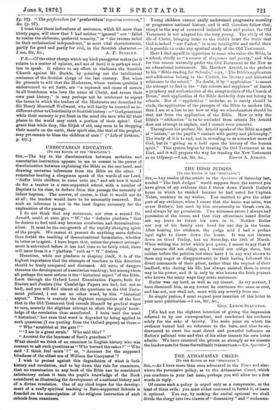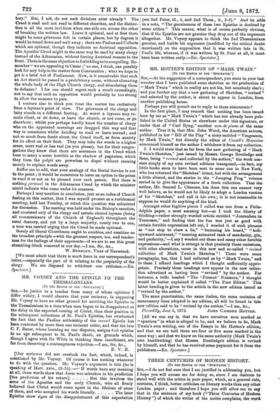THE ATHANABIAN CREED.
[TO THE EDITOR OF THE "S1'ECITATOR:1 SIR,—As I have more than once advocated in the Times and else- where the permissive policy, as to the Athanasian Creed, which you condemn in your last issue, perhaps you will allow me a few words in reply.
Of course such a policy is urged only as a compromise, as the least of three evils : you must either command it, forbid it, or leave it optional. You say, by making the recital optional we shall divide the clergy into two classes of " damnatory " and " undamns, tory." But, I ask, do not such divisions exist already ? The Creed is read and not read in different churches, and the distinc- tion is all the more invidious when one side can accuse the other of breaking the written law. Leave it optional, and at first there might be some grievance felt in certain places, but by degrees it would be toned down and melt away ; there are Psalms and Collects which are optional, though they indicate no doctrinal opposition. The Apostles' Creed might in the same way be used by many clergy instead of the Athanasian, without forcing doctrinal reasons to the front. There is the same objection to forbidding as to compelling. Re- member " we are appealing to Caesar ;" no one, I think, can possibly look for any help in the matter from Convocation ; what we hope to get is a brief Act of Parliament. Now, is it conceivable that such an Act should be passed in a prohibitory sense, without alienating the whole body of the High Church clergy, and stimulating them to defiance ? I for one should regret such a result exceedingly, not to say that such an opposition would probably be too strong to allow the measure to pass.
I venture also to think you treat the matter too exclusively from a layman's point of view. The grievance of the clergy and laity stands on a different footing. At worst a layman may re- main silent, or sit down, or leave the church, or not come, or go elsewhere ; whilst you perhaps hardly know the number of clergy who on the appointed mornings are dragged this way and that way in conscience whilst deciding to read or leave unread ; and not so much from doubt about the Creed itself, as from anxiety for its effect on their flock. They may take the words in a higher sense, more real or less real (as you please), but for their congre- gations they know that there are sentences in the Creed which bear to many a sense horrible as the shadow of paganism, which they from the pulpit are powerless to dispel without seeming merely to explain words away.
Suffer me to add, that your analogy of the Burial Service is not to the point ; it would be monstrous to leave an option to the priest to read it or not as he pleased over each person. But there is nothing personal in the Athanasian Creed by which the minister could indicate who come under its censures.
Perhaps I may mention in conclusion, just as an index of Church feeling on this matter, that I was myself present at a rurideeanal meeting, held last Tuesday, at which this question was submitted for discussion. The meeting was held under the Bishop's sanction, and consisted only of the clergy and certain elected laymen (being all communicants of the Church of England) throughout the rural deanery, and yet by a large majority, nearly two to one, a vote was carried urging that the Creed be made optional.
Surely all liberal Churchmen ought to combine, and combine on the broadest principle —with the greatest respect, too, and tender- ness for the feelings of their opponents—if we are to see this great stumbling-block removed in our day.—I am, Sir, &c., W. BERKLEY, Vicar of Navestock.
[We must admit that there is much force in our correspondent's letter,—especially the part of it relating to the perplexity of the clergy. We are disposed to withdraw our criticism.—En. Spectator.]



































 Previous page
Previous page